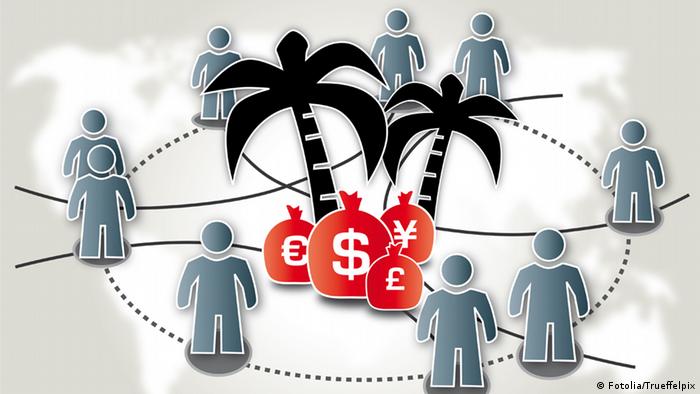German banks have helped customers funnel money into tax havens for decades. "Offshore Leaks" has brought both parties under scrutiny, and now German politicians want to make it harder to hide from the taxman.
The German government was clear about its position on data released concerning deposits in tax havens around the world.
"We expect, and welcome, that the relevant documents will be submitted to appropriate national tax authorities," a spokesperson for German Finance Minister Wolfgang Schäuble said of the offshore tax haven data published on Thursday.
As the 2.5 million pages of "Offshore Leaks" documents are sorted through, national authorities will begin investigations and follow up with indictments. The battle appears to have begun.
"We're now in the midst of intense, international cooperation," German parliamentarian Matthias Middelberg told DW. The politician sits on the finance committee of the Bundestag, or lower house, and is a member of Chancellor Angela Merkel's Christian Democratic Union party (CDU).
The government won't face any internal resistance from the Free Democratic Party (FDP), the junior coalition partner and Germany's most business-friendly party.
"German Finance Minister Schäuble has the full support of the FDP," said Volker Wissing, the party's deputy chairman in German parliament, adding that the situation of multinational companies paving 5 percent in corporate taxes through skilful manipulation while small firms are hit with 30 percent taxes needed to end.
Not always successful
The release by an offshore network of internal documents from 10 tax oases has brought tax evasion back into the limelight. The extent of the greed is large, with billions in taxes at stake.
It's an issue German governments has been grappling with for decades. Agreements to reign in European tax oases like Luxembourg, Liechtenstein and Cyprus, have often fallen victim to domestic German politics.
The most recent efforts by the governing CDU/FDP coalition called for a one-time tax levy of between 21 percent and 41 percent of funds illegally sheltered in Switzerland. The agreement, however, failed after it was rejected by the opposition Social Democrats and Greens who were not willing to allow tax evaders to remain anonymous.
Opposition support
Today, the Social Democrats view the "Offshore Leak" revelations as an opportunity to take advantage of previous - and very recent - measures against tax havens. Lothar Binding, the SPD party's finance committee head, said the creation of an international "black list" that included the names of countries that bend market rules unfairly has proven successful.
"Today we're in a position to negotiate double-taxation agreements with the administrations of tax shelter countries in a way we couldn't have dreamed of before," Binding told DW. In general, the Social Democrats would like Germany to push for an automatic international exchange of tax information.
"We're going to ban business models that rely on tax havens for as long as those havens don't participate in the exchange of information," he added.
Axel Troost, who also sits on finance committee for Germany's Left Party, considers such a system more than just a "dream." Twelve years ago, he said, the social justice network Attac demanded a financial transaction tax that was then seen as completely unrealistic. "Today it's here," Troost said.
The Left would also like German banks to take more responsibility. "Whichever banking institute accepts state aid, for example, should have to withdraw from tax havens Troost said.
Green future
The most far-reaching measures with regard to taxes, however, are being developed by German parliamentarians Gerhard Schick and Uwe Kekeritz, both members of the Green party. According to German public opinion institutes, the Greens are the most likely coalition partner for either the CDU or SPD after the next round of elections in September.
 Deutsche Bank has also been hit by recent mortgage-related lawsuits and other regulatory investigations
Deutsche Bank has also been hit by recent mortgage-related lawsuits and other regulatory investigations
The Green Party envisions a system that requires companies to publish their profits in each country around the world. In such a scenario, businesses operating in tax havens would have a tax levied by their country of origin - in this case, Germany - in addition to paying local taxes. Tax consultancies would also be forced to register their own tax reduction techniques with government officials.
"That's how Great Britain and France do it, for example - placing a sort of punitive tax on transactions with tax havens," said Schick. Schick would also like to prohibit German banks from making offers to their clients that include transactions with tax havens. "We have to force German banks to finally do away with business models based on tax evasion and money laundering. Germany should make it very difficult for its banks to be active in tax havens." dw de



No comments:
Post a Comment